| |
"Although his wit scratches more than it bites, it is undeniable enough to place his area of greatest aptitude somewhere between the brittle worlds imitative of Oscar Wilde and F. Scott Fitzgerald. His vibrant women shine with special brilliance from midnight to the 3 o’clock in the morning of the soul." |
| |
Andrew Sarris on director Joseph L. Mankiewicz
from his classic tome, The American Cinema (1968) |
I'm a sucker for the old, huge, dark houses and hidden secrets melodrama genre. There is something oddly both comforting and unnerving about the shadow-filled setting and the characters that can afford to live there, anguished and tortured as they are. When you are dealing with privileged people, it's always the stuff they can't get through 'normal-for-the-rich' channels that powers the action. Hollywood, in dealing with tropes to make things easier for the audience, usually presents two sides of the rich/powerful coin. These characters are either benevolent, well-meaning patriarchs (matriarchs hardly get a look in) who want happiness for all while maintaining their grip on power or they are motivated by the acquisition of some cherished desire that eludes their usual channels of acquisition and stamp all over people to get it. The latter earn the audience's suspicion and hissable contempt. I wonder what category Nicholas van Ryn falls into? I'll give you a clue. He's played by Vincent Price and if that name doesn't register then you are absurdly young, damn you, and may have seen this horror icon in Tim Burton's Edward Scissorhands as Edward's inventor. In Dragonwyck, it's Price who is absurdly young (well, OK. 34.) and he is something of a revelation. This was Price before hoisting the playful horror backpack on to his shoulders, before the self-knowing, fourth-wall flirting. This was an actor who, De Niro like, lost 30 pounds to play this particular role. He walks the house and grounds like an uprooted, malevolent reed. Bless him.
It's the mid 1800s. A God-fearing farming family (and God-fearing is putting it mildly) in Connecticut receive a letter from a distant relative requesting that one of the young daughters make the trip to the Catskills in New York State. Her father, infused with rampant religiosity, is against the idea. Christ, what it must have been like to live your life according to the Bible's tenets. Can you imagine reading a fricking book every time you wanted to make an important decision? Back to the plot. The daughter, Miranda, eventually grasps the nettle and finds herself at a grand, old house. Her benefactor is the tall and imperious Nicholas van Ryn, an aloof aristocrat whose superiority comes off him like a skunk-delivered stench. After his wife dies, he comes on to Miranda who falls in love because presumably it was better than living on a farm in Connecticut. But she's going to test him and van Ryn has to officially ask Miranda's father to let her become his bride... Then things don't go too well for all concerned. But you knew that, right?
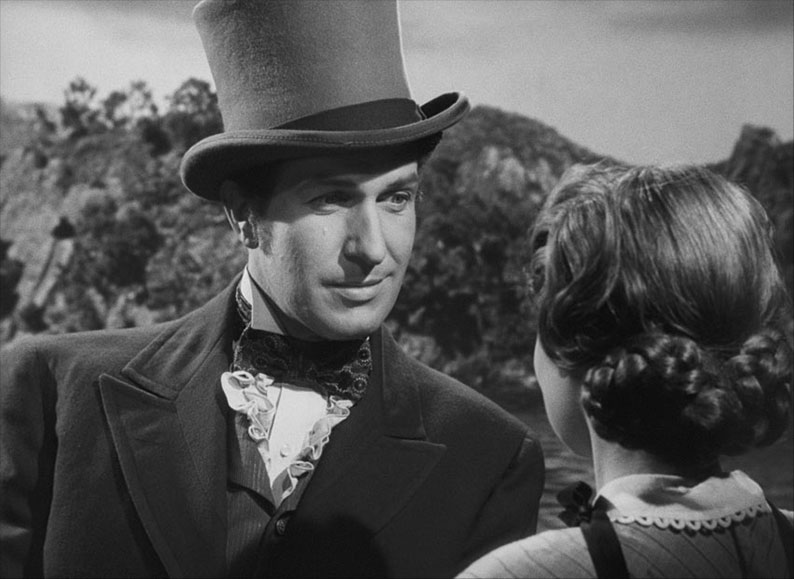
The trajectory of the narrative is signposted well before secrets are revealed and there's not too much effort required to figure out who's doing what for what reasons. But the sheer fun of the film is derived from the performances and all the actors seem to be aware of what kind of a film they are in and act accordingly. Some may see a few scenes as being over-acted but in a melodrama, that's de rigueur, acceptable and by some, myself included, favoured. And if Price can chew scenery at times, he does it with a palpable joy in his own performance which is neither arrogant despite the character he's playing nor false. He is one of a very rare set of actors who can embody stardom, convince as a character actor (what actors are not character actors? Stars, I guess) and have you smiling with guilty glee at his more heinous behaviour. In the movie he is a Dutch descended land baron also known as a 'Patroon' with manorial rights over the land due to the Dutch ownership of a lot of acreage around New York. He sits like a king on a wooden throne and invites his farmers to offer him produce as payment for living on his birthright. Is it me, or is the very idea of a literal 'birthright' repugnant? A very young but instantly recognisable Harry Morgan (a great character actor, probably most recognisable from the M*A*S*H TV series, playing Colonel Sherman Potter) rebels and almost commits murder in the spirit of defending farmers' rights. They are Americans now, free, living off land that no one but the farmer should own. Vincent Price is darkly unsympathetic.
Gene Tierney, whom I believed for most of my life was an male actor (cross-gender name and era unfamiliarity issues), plays Miranda, the beautiful 25 year old who is smitten simply because Nicholas is the first man who has expressed an interest in her. Her naiveté seals her short-term fate. But she's determined and anxious to get to the root of her new husband's erratic behaviour. Their relationship is not helped by Price's exhortation that "...deformed bodies depress me." after his wife has hired a handicapped personal assistant. I was astounded to see a teenage Jessica Tandy as the limping Peggy until I did my research... She was 36 in 1945. As I said, astounding. Tandy was the original Blanche Dubois with Brando in Broadway's smash and historic A Streetcar Named Desire, the theatrical production that offers a very special sort of immortality. But to me she will always be the poster girl for Hitchcock's The Birds, the mother of Mitch who's scared witless (as I was) by the lack of eyes in the skull of a nearby neighbour after a bird attack. Walter Huston does such a good job as the God-bothering father to Miranda that I cringed whenever he clung to his King James and forced others to read from it. He let some random passage chosen by his daughter to seal her fate (a fate she desired a great deal). He reminded me too much of the father of the hero in John Wyndham's superb science fiction novel The Chrysalids. Joseph Strorm is so easy to despise for putting to death or banishing those born that do not conform to his God's version of human bodily perfection. Walter Huston would have convinced me, hands down as that despicable character. In the part of 'the guy whom Miranda should really be with' is Glenn Langan as Dr. Turner. His square jawed, clean cut, broad shouldered puppy love falls off him like dandruff but going up against van Ryn, he's useful in a confrontation. One more character deserves a mention; housekeeper Magda played by Spring Byington. Talk about scenery chewing. She plays a Mrs. Danvers-lite character whose main goal in life is to scare the hell out of the new arrival grinning like a maniac and she does this with comic panache and I'm fairly sure that wasn't the intention.
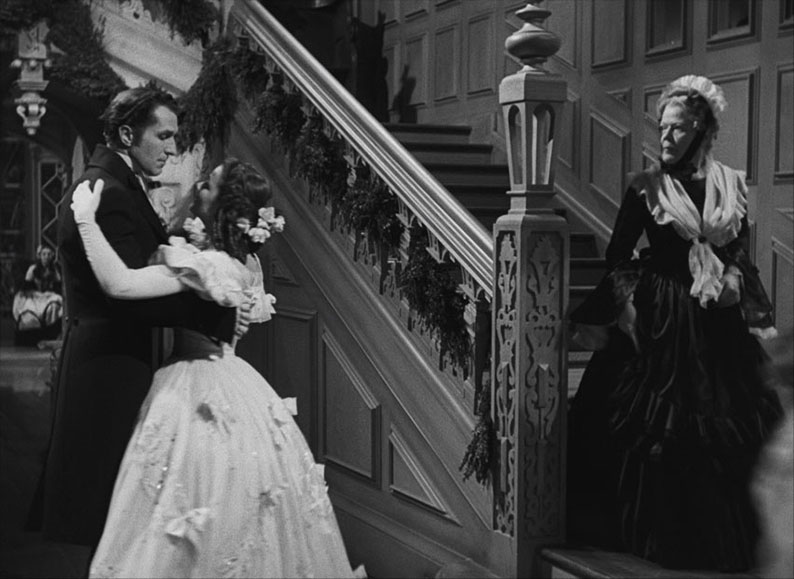
There is a supernatural element in the film that goes not only unexplained but is actually quite creepy. Nicholas's daughter, for whom Miranda was summoned to take care of, gets up at 3am hearing a harpsichord and a woman singing and laughing. This in itself is creepy. Miranda joins her on the stairs but can hear nothing. The same happens to Nicholas later in the film when in a bit of a state. The only nod to any explanation is the constant cutting to the unnerving portrait of his great grandmother, Azeel. I'm afraid I can never take portrait power seriously after seeing Steve Martin ask his dead wife's portrait permission to marry again in The Man With Two Brains. The portrait starts spinning and a ghostly voice screams "Noooooo!" and blasts air at Martin who just stands there taking it. His lust for Kathleen Turner is so great that he just repeats "Any sign at all!" before taking the portrait down and hiding it somewhere. Lovely. Incidentally, we see the daughter Katrine in a few scenes and given she's the reason that Miranda is at Dragonwyck, it does seem odd that she disappears after her ghostly encounter never to be mentioned again.
Mankiewicz's direction is decidedly unfussy with a subtle roving camera but most of the film is studio-bound in the way most Hollywood movies were of that era. His camera never looks anything but lovingly at our heroine and low angles (a sort of default on the very tall Price) emphasise the power and haughty demeanour of the privileged Patroon. Speaking of low angles, Mankiewicz seems to go to great lengths to include portions of ceilings in his compositions. Every time I saw a ceiling I was reminded of the other director famous for his ceilings (traditionally areas from which lights could be suspended), Orson Welles and his Citizen Kane, we must remember, was co-written by Joseph L.'s older brother Herman Mankiewicz. The director's own adaptation of Anya Seton's 1944 novel is a workpersonlike affair with a few one-liners worthy of note... "Everything is what no man should ever want," is a doozy delivered by Miriam's devout Dad and this one from Price, denouncing faith, always tickles... "I believe in myself and I am answerable to myself! I will not live according to printed mottoes like the directions on a medicine bottle." There are several changes as there will invariably be from page to screen but not having read the book and seen the extras, it seems that Mankiewicz was somewhat faithful to the source material.
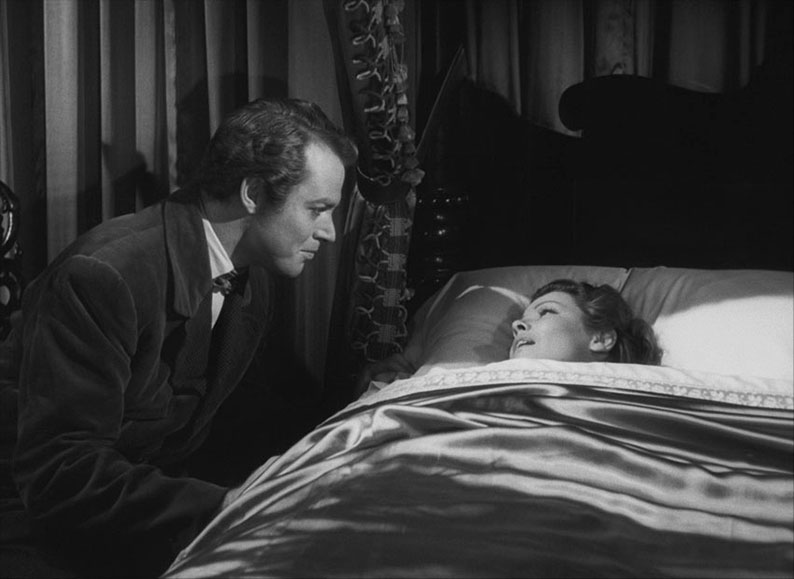
A fascinating and entertaining example of the genre, if a tiny bit derivative with some fine performances, Dragonwyck is great fun and features Vincent Price's breakthrough role.
Note: in the penultimate front credit, the Roman numerals state the date as 1946. In the end title card, US War Bonds and Stamps are advertised, for a war that ended a year ago in 1945. The film was delayed for a year which would explain the ad at the end but then why were the front credits showing the correct date?
Dragonwyck is presented in the 1.37:1 aspect ratio and for a 74 year-old movie, it looks absolutely gorgeous. On the HD version on my HD monitor it seems the contrast is ever so slightly boosted. It has a lovely, steely black and white sheen that personally I really love. Look hard and you can see the grain swimming and fizzing but at optimum viewing length from the screen, it's all but invisible.
And now, an admission of technical naiveté. My Blu-ray preview disc gives you a choice of the HD version or the 4K restored version. As Slarek has rightly pointed out, this does not mean that I am seeing a 4K picture, just a different 1080p version based on the restored 4K Restoration. The reason I started to believe that I was watching the actual 4K picture was threefold. (1) I have just bought an Ultra HD Blu-ray player to replace my older broken standard Blu-ray player. (2) I have a 4K monitor I use to check picture quality on a 4K production I am working on at the moment. When playing the 4K Restoration, the TV almost subversively told me I was watching a 4K picture, the deceptive bastard... Metadata?

(3) Why would Indicator offer two versions of the film, underlining one was a 4K scan? Well, the answer to that question is simply that one was restored and the HD one was not but I can't find any information in the paperwork to confirm this, only on the disc that says the choices are (a) 4K Restoration and (b) HD Remaster. OK. So I wrote my initial review on the quality believing I was seeing a 4K picture. I have now trashed that review based on a misconception. Given all that, I would love to see the film on UHD Blu-ray now I have the kit to appreciate it on.
The 4K Restoration at 1080p does show up some special effects to be just that. There are obvious paintings meant to be New York and miniatures like Dragonwyck itself and a steamboat model intended to show how different a world Miranda is moving into. Of course, you should never forget that we really shouldn't be surprised at the detail 35mm film could capture. It was intended to be projected on huge screens in places called 'cinemas'.
The HD Remaster version is significantly sharper and a touch more contrasty. The 4K Restoration is much softer and I wonder if that's a computer filter passed over the scan. It reminds me of the beauty filters old movies and TV shows used to shoot actresses with so they would appear to soften and glow. As I said, close up in the HD version the grain fizzes but physically move back and it disappears.
I was telling a neighbour's teenager just yesterday how extraordinary 35mm film is and it's a technology that's 110 years old. And in that tiny frame (36mm x 24mm), the physical reactive silver salt crystals in the celluloid are able to capture 4,000 lines of resolution. This is why older movies are a jaw dropping revelation after years of standard definition TV and SD VHS and DVDs...
The scrubbed up original mono soundtrack sounds terrific for its vintage, not a single line reading hard to catch. This probably has more to do with the actors' training but technically it can't be faulted.
There are new and improved English subtitles for the deaf and hard-of-hearing.
Two presentations of the film: the 2017 4K Restoration, and the legacy High Definition re-master
See Sound and Vision above.
The John Player Lecture with Vincent Price (1969): archival audio recording of the celebrated actor in conversation at London's National Film Theatre (75' 44")
Just lovely. Within the first minutes, Price says that he taught children early in his career and found that "...the little bastards knew more than I did." Price is an accomplished raconteur and it's clear the audience loves him. I didn't know he was connected briefly with the Mercury Players, Orson Welles' theatrical troop. Price describes how his character met his end in the Seton source novel and how Hollywood changed it and that therefore it was necessary to do no research because Hollywood changes everything anyway. What a lovely justification for laziness. Price finishes with a reading of an Edgar Allen Poe poem, the title of which was purloined to rename the American release of Witchfinder General – The Conqueror Worm. I never understood why the title was changed. My favourite quote? "Anyone that pretty deserved to be whipped!" although whom he choses as the most unforgettable person – actor or character – in his long career and what he says about them comes a close second.
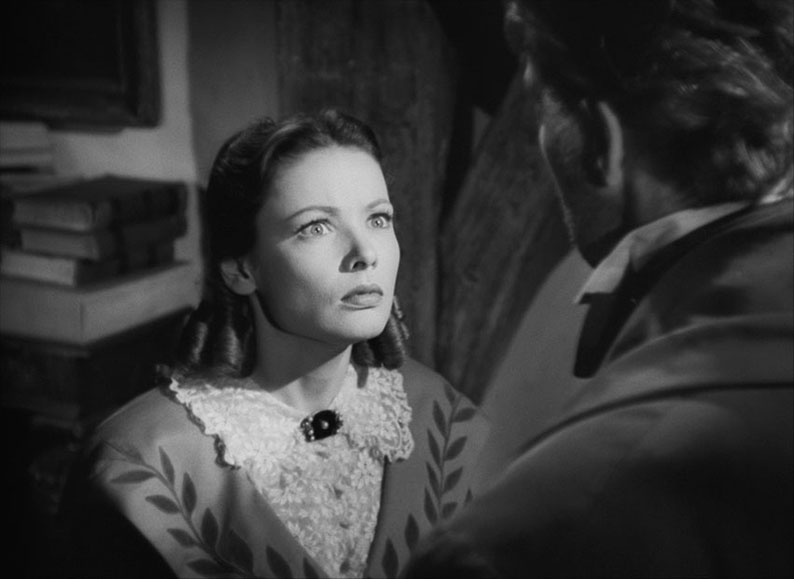
Audio commentary with film historian Steve Haberman and filmmaker Constantine Nasr
Bang! Composer Alfred Newman was nominated for 45 Oscars and won 9. We're not a minute in and the team are throwing out information like Google fire hoses. Haberman and Nasr are determined to cover every frame with relevant information. That's not a criticism but the info stream is relentless! I took it in at the time of delivery but once another nugget comes along, you're saying "Hold on, let me process this stuff!" There are periodic but small gaps in the commentary to let the speakers breathe I imagine. Great detail on deleted scenes and why they were deleted. They give us the benefit of the one particular deleted scene – one, which they believe, made Lubitsch disown the film – by performing it, accents and all. It's a powerful scene where we get to learn just how ruthless and Nazi-like van Ryn actually is. Lubitsch of course was German. The two actually quote the line I quote about breasts (later on in the review of the booklet) and the importance of their complete invisibility. Glad the pair shared my profound unconcern on this issue. Haberman, in discussing Mankiewicz's personal style, uses the word 'oeuvre' and pronounces it 'oove' which made me smile. It's one of those movie-centric and ridiculously pretentious words (which I certainly am guilty of using) but in pronouncing it in American English, it somehow punctures its pomposity. For those hungry for information about this movie and those involved, this is a treasure trove of information. Bravo both. Nasr at the wire reminds us that "It's a Gothic horror film, folks. Don't forget it!"
A House of Secrets: Exploring 'Dragonwyck' (2008): documentary featuring interviews with filmmaker Tom Mankiewicz, horror and fantasy authors Stephen Jones and Kim Newman, and others (16' 08")
Some great background information in this extra including a fact that I was sorry to hear about. Imagine being a first time director, in awe of the man who was to direct it who had to take a producer's role because of the after effects of a heart attack. Mankiewicz and the great Ernst Lubitsch fell out over this film to the point where Lubitsch had his name removed. There are a lot of great details unearthed by the interview subjects and it's nice to see the film regarded as Gothic horror almost as much as Gothic melodrama. And what a launch pad for Price and his future career.
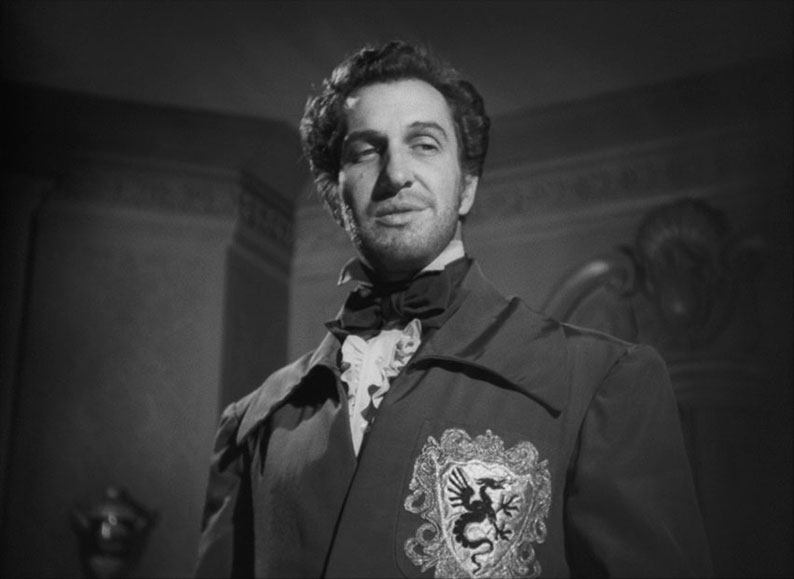
Lux Radio Theatre: 'Dragonwyck' (1946): vintage radio adaptation of Anya Seton's novel, starring Vincent Price and Gene Tierney (59' 41")
It's so funny hearing how radio advertising is worked into the introduction and made relevant to the radio play they are presenting. This time Lux flakes can get Dutch costumes sparkling clean! It's clear that Lux could afford the big stars. We chop off the start of the film and jump right in with Miranda and her disgruntled father at Nicholas van Ryn's hotel. It follows the film very closely. Why they don't just remix and edit the actual film's soundtrack is beyond me. Was there a huge audience at the recording to see the stars go through their paces? Oh, and they cut the last line of the movie which seems a bit redundant. Stay for the outro, a rather ridiculous advert between two wives demanding Lux flakes to wash dishes with. It's glorious! Then there follows supposedly off the cuff chat between the host and the two stars. Despite Price's talent, it is so obviously scripted. Another ad follows with a plug for the next Lux presentation, To Have and Have Not.
The Screen Guild Theater: 'Dragonwyck' (1947): vintage radio broadcast, starring Vincent Price and Theresa Wright (24' 43")
Similar to the Lux presentation without the Lux commercials but the actual drama is told as a memory retold by Miranda. Standing in for Tierney is Theresa Wright and she does a fine job. The story is much abridged, lopping a good hour plus off the film's running time. And the ending is rewritten so that the (damn, spoilers) main event at the close replaces a fistfight. I guess they don't work so well on radio. Theresa Wright then plugs a Motion Picture Relief Fund and its country house (whatever that is).
Isolated music & effects track
For composer Alfred Newman completists only.
Original theatrical trailer (2' 16")
A bit battered but perfectly serviceable as a trailer despite its audio blemishes. It does a fine job of promoting the film especially to those who loved Rebecca. The clips are well chosen and well cut. It's (as the inter-title says...) "The romantic drama of a woman whose heart challenged her conscience...." Can't say fairer than that.
Image gallery: on-set and promotional photography
In this abundant collection, we have 70 very high contrast black and white publicity stills presented as singles or doubles on screen. Then we have a grand total of 49 behind the scenes stills and publicity material in singles and doubles. There are 11 poster designs again presented both singly and in doubles on screen and they are in black and white and colour. Some publicity shots are priceless (no pun intended) with Vincent hanging out with his would be murderer, both smiling. I did enjoy my trawl through this lot.
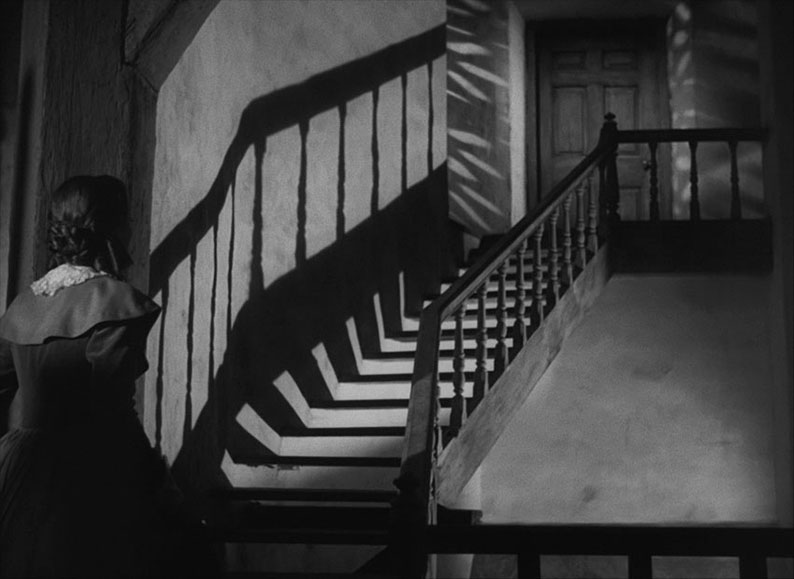
Limited edition exclusive 36-page booklet with a new essay by Neil Sinyard, an overview of the film's Production Code history, Gene Tierney interview extracts, an overview of contemporary critical responses, and film credits
Sinyard's essay is reliably comprehensive and a fun read in terms of all the background snippets on the production. The article on the film's script's toeing the production code line is a window into 40s Hollywood morals and bare-faced hypocrisy that it gave me a few chuckles. Did you know that... "We wish to call to your attention the still of Judy Marshall #460. We believe the breast line rather accentuates the breasts in such a way as to be offensive in the finished picture, and we suggest that you check this costume." If the person who wrote that suddenly woke up in 2019, they would be dead of embarrassment within the hour. The third piece describes how Gene Tierney met JFK on the set of Dragonwyck. He really had quite the thing for actresses. The Critical Response to the film is relatively short and on the disc's credits double spread is a copy of the poster... This seems to show, presumably Vincent Price but you can't see his face, pinned and held to the breasts of Gene Tierney. I guess the Production Code only worried about the movies and not the attendant advertising? Great booklet, for sure.
Dragonwyck is a Gothic potboiler with rich (in more ways than one) and substantial character types, Arthur C. Miller's gorgeous black and white cinematography which takes advantage of every shadow and an almost wall to wall score by Hollywood legend Alfred Newman. For fans of this genre, this is a solid entry. Well recommended.
|